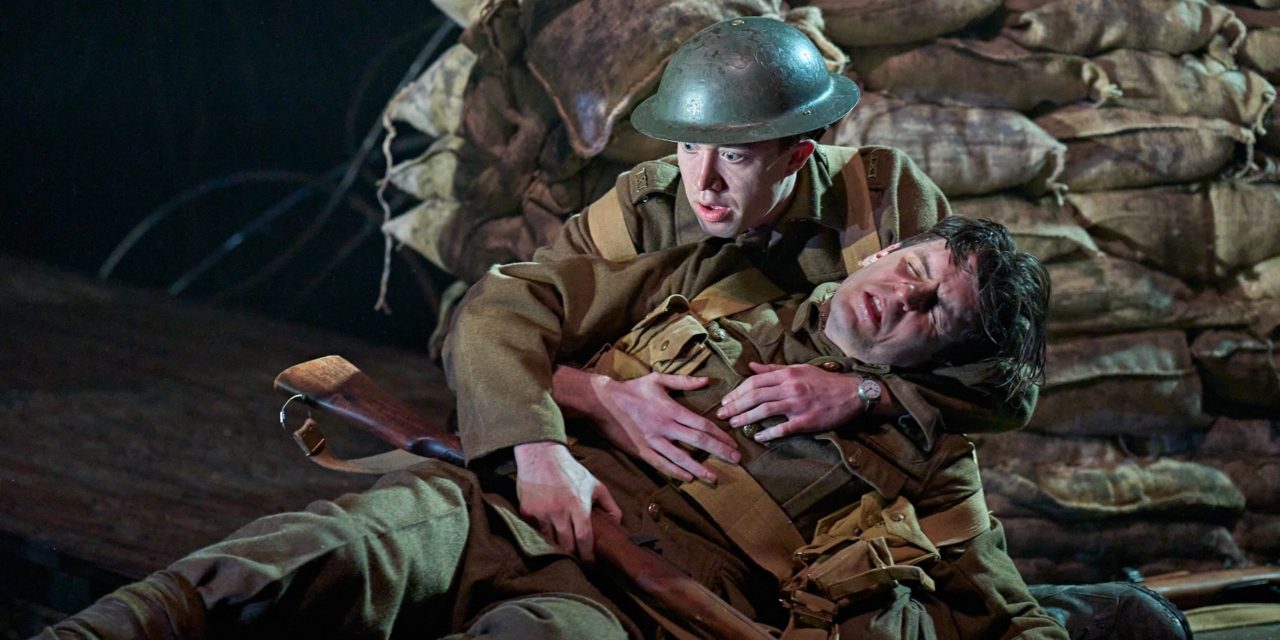
12 – 16 April
Yesterday’s papers featured a photograph of a Ukrainian army unit ‘digging in’. A group of six men could be seen lying in a freshly excavated earthworks designed to protect them from incoming shells and mortar from the advancing Russian army. Is this a scene anyone expected to see this century? It seems as if we have been forced to climb aboard a backward-spinning time machine with its dial stuck on 1916. Morpurgo’s tale of brotherly love set in the trenches of the First World War is a reminder of the consequences of lessons unlearned, of humanity’s ability to repeat the same terrible mistakes. But that sometimes it is within the darkest moments that we can find clarity for what really matters.
Michael Morpurgo’s children’s novel about two brothers fighting together on the western front at Ypres tackles the biggest themes head-on. Death, devotion, loyalty come under scrutiny as does the questioning of those in positions of authority, be they cane-wielding school teachers, bullying army sergeants or officers handing down appalling cruel sentences to make examples of those who have, for whatever reason, been unable to fulfil their ‘superiors’’ orders. Morpurgo has talked about having his eye caught by a framed letter on display at the Ypres War Museum. The letter is addressed to the mother of a British soldier informing her that her son had been shot at dawn by firing squad. Empathising with the terrible impact this single sheet of paper would have had on its recipient, the idea for a story centred on an anti-hero caught up in the nightmare of war took hold. Private Peaceful, first published in 2003, remains a powerful metaphor for the values of humanity in the face of the cold realities of war.
The play is set in two distinct halves. In the first we meet brothers Charlie, Tommo and their brain-damaged sibling Big Joe (Robert Ewens) growing up in Devon largely untroubled by the wider world until their dad dies in an accident and they have to be brought up by their mum who has her own battle keeping a roof over their heads. In the second we move onto the First World War killing fields. The action is threaded together throughout by Private Tommo Peaceful reliving his life, as the hours tick by during the night before his brother’s execution by firing squad, for failing to obey orders.
In the flush of youth, Charlie and the younger Tommo both fall for the same girl, Molly (Liyah Summers). There are idyllic scenes of them innocently skinny dipping in a river. Suddenly a plane flies overhead, (excellent sound track by Dan Balfour) – something none of the children have ever seen before. And although the pilot lands close by and offers the children boiled sweets, his arrival can be seen as the harbinger of another world breaking into their idyll; one that will eventually tear them apart.

Daniel Rainford as the young Tommo projects a simple lad with few pretensions. But as he counts down the hours till dawn, he touches much deeper emotional territory as he asks us, “what is all this for”.

Daniel Boyd gives Charlie conviction to his role as the older, sexually more mature of the two. Later when Charlie and Tommo find themselves in the hell of no-man’s land, he exudes unquestioning care for his younger sibling, while John Dougall stands out as the uncompromisingly tough Sergeant Hanley.
Lucy Sierra’s adaptable stage is brought to life by Matt Haskins’ atmospheric lighting which provides both a warm backdrop to the Peacefuls’ early lives, before transitioning into the forbidding silhouettes that presage the battle sequences.
Morpurgo could never have imagined that his story would ever be associated with a contemporary crisis such is happening now in eastern Europe. ‘Never again’ was the cry in 1918, but here we are.
★★★★☆ Simon Bishop 13th April
Photo credit: Manuel Harlan


